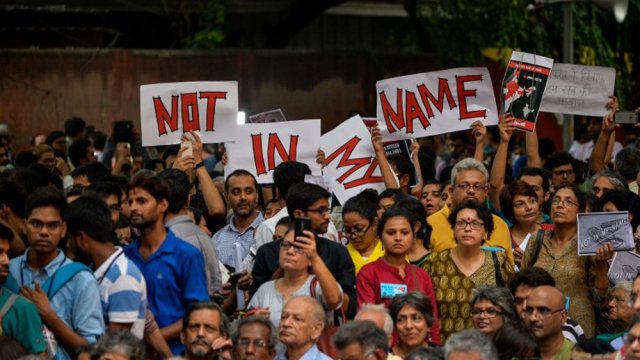
A new campaign, #Notinmyname, is sweeping India and some major international cities, with protests breaking out against a recent streak of Muslim killings near the capital, New Delhi.
The campaign was started by filmmakers and activists Saba Dewan, Rahul Roy and Sanjay Kak. Protests against the Muslim hate crimes took place on June 28 in Delhi, Chandigarh, Lucknow, Allahabad, Hyderabad, Bangalore, Kolkata and Trivandrum.
Protests also took place internationally in Britain, Canada and the US.
The movement has been fuelled by crimes such as those against three brothers who went to New Delhi to shop for the Islamic festival of Eid. A small argument over a seat on a train turned to religious slurs as the boys were taunted for being beef-eaters, one of the brothers, Shabir, 23, told The Indian Express from a hospital bed.
They were slapped and one had his beard pulled. According to a report filed by the police, a group of 10 to 12 young Hindu men pulled out knives and stabbed the brothers. A photo from the incident shows the blood-drenched train compartment. One of the brothers, 15-year-old Junaid, died in his brother’s arms.
“Junaid’s killing was completely shattering,” Dewan explained. “That really agitated me. I thought if someone will not speak up, I’ll protest.”
She decided: “If no one else, I’ll protest. I’ll say not in my name.”
Dewan turned to Facebook to call for protests against the mob lynching. “In that emotional moment, I wrote on Facebook, asking shouldn’t we all be protesting as citizens.”
Dewan got an overwhelming response.
After the terrifying lynching of several others, Muslims all over India observed #BlackEid. Grieving the Muslim lynchings, thousands of worshippers marked the end of the holy month of Ramadan wearing black armbands during the special prayers as a mark of solidarity with the victims of the religious hate crimes.
Junaid’s death was met with a deafening silence from the ruling right-wing Bhartiya Janta Party (BJP). The day after his death, not a single BJP minister showed up at the president’s traditional Iftar, a religious observance of Ramadan where the community breaks the fast together, held at the president's house, Rashtrapati Bhavan.
When in April, 55-year-old dairy farmer Pehlu Khan was lynched for transporting cattle, not a single BJP minister condemned the act. But BJP ministers were infuriated by the public slaughter of a calf by workers from the opposition Congress party in Kerala.
“The attacks are at the level of systematic violence and the state is maintaining complete silence and that is the most worrying part as that is creating a sense of impunity for all those people who can go out and lynch a Muslim,” Dewan told TeleSUR English.
The spate of lynchings has moved the collective consciousness of many progressive groups and activists in India and abroad.
“The campaign evolved organically and I think there are many people out there who were repulsed by what’s happening and have decided to join in,” Dewan said. “It’s a citizen's movement and is gathering momentum.
“People care, we care about our fellow citizens and there are many of us, not one, not few, but many who want India to be secular, inclusive and which doesn’t discriminate between its citizens. And that’s the more important message that is coming through.
“This movement is happening simultaneously and it’s not as if someone is igniting it. It also means that we will not give in to the narrative of hate, spun by the ruling elite.”
Communal violence is not new to India. It has its roots in the horrendous animosity between Hindus and Muslims that led to one of the world’s largest exoduses, the partition of 1947 that divided India and Pakistan.
“We don’t seem to learn from our history,” Dewan said. “We have a legacy of communal hatred and animosity.
“Junaid’s village is next to us in Delhi, it was very revealing what some of the villagers said. They said, ‘We feel shame for the fear we feel’ and that is a loss of dignity and I can’t think of anything more terrible.
“A government that strips people of their dignity, what else is left to say.”
[Abridged from TeleSUR English.]
Like the article? Subscribe to Green Left now! You can also like us on Facebook and follow us on Twitter.